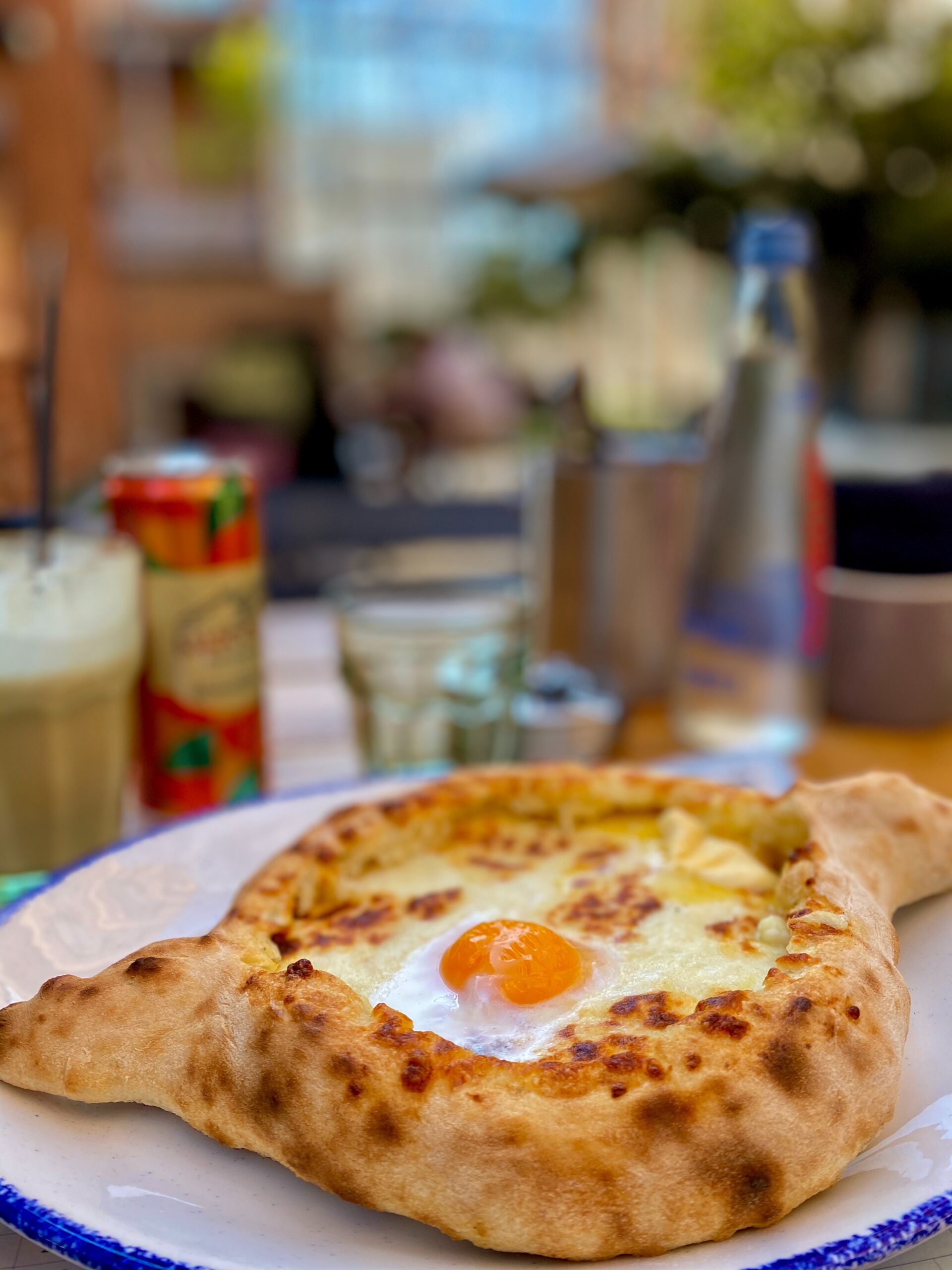Descending the escalator into the bowels of Moore Street, I was already breathlessly anticipating that first bite of cheesy Georgian deliciousness. A fanatic for the strong and savoury flavours of the South Caucasus, to say I had been thrilled to learn of a newly opened Georgian eatery is an understatement.
“The menu – printed in both English and Georgian – offers well-priced traditional dishes from the region – khachapuri (baked cheesy bread), khinkali (handmade dumplings), and lobio (rich bean stew) to name a few classics”
Tucked away in a subterranean food court just north of the Liffey, “Georgian Delight” sits snugly alongside a Chinese all-you-can-eat buffet. The menu – printed in both English and Georgian – offers well-priced traditional dishes from the region – khachapuri (baked cheesy bread), khinkali (handmade dumplings), and lobio (rich bean stew) to name a few classics.
On my most recent visit to this little piece of the Caucasus I had the pleasure of meeting “Georgian Delight” managers Alexandre Khonelidze and Akaki Berulava. Over tea and khachapuri we discuss their achievement of bringing Georgia’s most-loved dishes to Ireland.
Akaki explains that the plans for a restaurant were put into action when lots of Georgians began arriving in Dublin – the number who call the city home now stands at a surprising 50,000. “People missed their national cuisine,” adds Alexandre, nodding, “I can cook these dishes for myself at home, but a lot of people don’t know how to or don’t have time.”
Attracted by the work opportunities here, Alexandre moved to Ireland from Georgia’s second biggest city, Kutaisi, four years ago. “At first we had the idea to start a bakery and sell lavash (a thin flatbread common to the South Caucasus), and after doing that for a while we decided to give this a go,” he continues, gesturing proudly to the tables around him.
“This happy fusion of cultures, enticing smells wafting from the open kitchen, and the constant hum of chatter in different languages makes for a homely and easy-going atmosphere where anyone feels welcome”
The idea has certainly come off. “Georgian Delight” caters to large groups of friends looking to enjoy a hearty weekend meal but is also an ideal place to get an affordable bite to eat after a long working day. “People like to get together here,” says Alexandre. “We get Ukrainians, Russians, Dublin locals, not just Georgians.” This happy fusion of cultures, enticing smells wafting from the open kitchen, and the constant hum of chatter in different languages makes for a homely and easy-going atmosphere where anyone feels welcome.
At breaks in our conversation Akaki and Alexandre jump up to greet new customers, warmly embrace regulars, and hurry in and out of the kitchen to fetch tea and baskets of bread – there is no doubt that the hospitality Georgians are so famous for is not something confined to their homeland.
A chef in a Georgia baseball cap laughs as he works in the kitchen, crafting dishes from age-old family recipes learnt by heart. “We bring a lot of our core ingredients over from Georgia,” my friends tell me. Clearly the mix of mozzarella and feta often used in the West to mimic sulguni (the salty Georgian cheese used in khachapuri), isn’t going to make the cut here. The decision to use native products certainly pays off – “Georgian Delight’s” versions of the staples are even more tasty than some I have eaten in Georgia itself.
Every element of each dish, from the fresh parsley stirred through the lobio, to the twists of dough which seal the tasty meal-filled khinkali, to the egg which is cracked atop the runny cheese of the boat-shaped khachapuri Adjaruli, is a homage to one of the most ancient civilisations in the world.
This food has a certain magnetism to it – you are left wanting still more even when you are bursting at the seams and, somehow, can always find room for that last khinkali. You feel part of something spiritual, enjoying dishes adapted and perfected over hundreds of years, and come away from the table feeling replenished, relaxed, and at peace.
Our conversation (with difficulty!) moves away from Georgian food. I am interested to hear about Alexandre and Akaki’s experiences living here in Ireland.
“This country has given me the opportunity to realise my abilities. I have big respect for Ireland. I came here with no English and people were always warm and helped me a lot,” says Alexandre, who could not speak highly enough of the place he has called home for the past four years.
Meanwhile, the two men have concerns about Georgia’s future. “Candidate status doesn’t educate the people,” Alexandre replies simply, when I ask whether he is pleased about the recent advancement in Georgia’s progress along the path to EU membership. “I want people in Georgia to be educated first – candidate status or not, that should be the first step.”
Life in Ireland, according to the guys, has opened their eyes to the extent to which their home country remains stuck in its Soviet past. “I see how people live here in Ireland,” continues Alexandre, “how children live. I bought my family here so they could see it too and see how happy people are.”
With whom else then, Akaki concludes, smiling, if not the Irish, would they have wanted to share Georgia’s delicious culinary secrets? Where else other than in an underground food court in the heart of the country that has treated them so well?
On ascending back up to ground level, I gaze confusedly at the Lidl next door, so immersed had I been in the Georgian world of cheese and bread below. Lazily, I wander back down Moore Street, definitely a few kilos heavier than I had been on arrival, but truly delighted.






